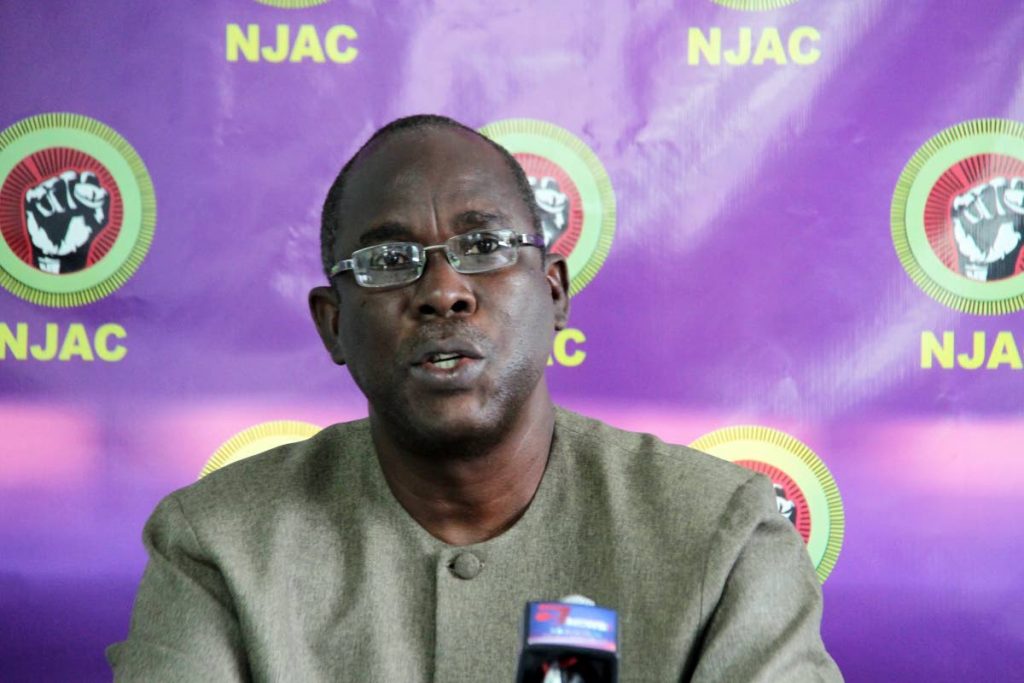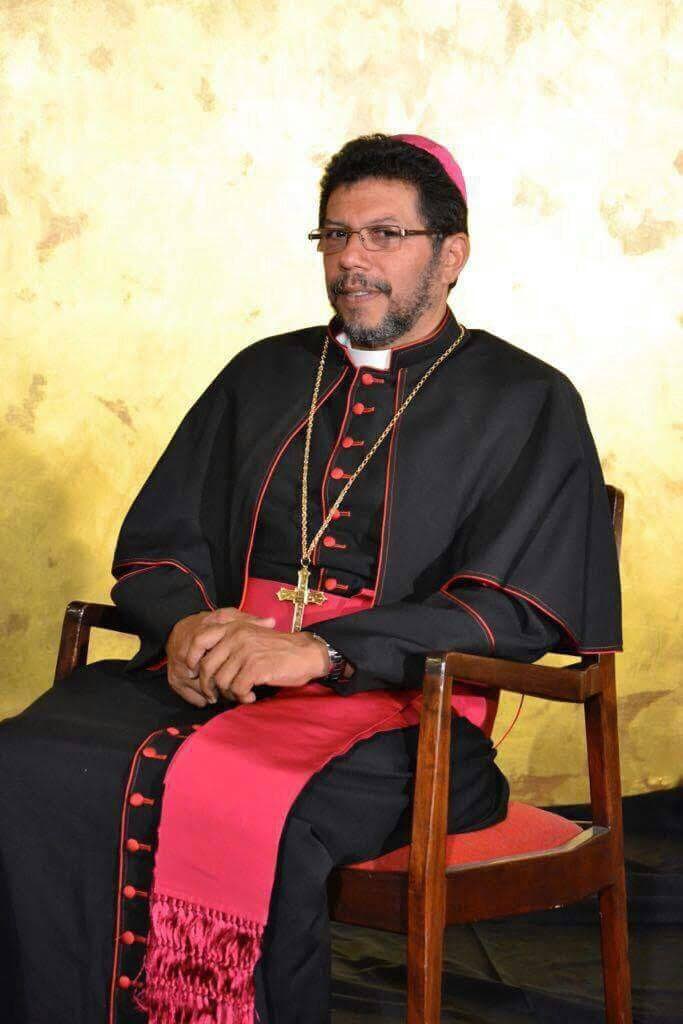NJAC marks 50th anniversary of Black Power revolution

Fifty years ago, thousands of people took to the streets in 55 days of demonstration that would be known as the Black Power Revolution, led by Chief Servant Makandal Daaga (then Geddes Granger) of the National Joint Action Committee (NJAC).
They were fighting for the underprivileged and the disadvantaged.
The demonstration led to the Cathedral of Immaculate Conception, Independence Square, Port-of-Spain.
It is no coincidence that NJAC will be celebrating its 50th anniversary at the cathedral on February 26, Ash Wednesday.
Kwasi Mutema, current servant political leader of the NJAC, said this was the beginning of the commemoration.
Mutema spoke to Sunday Newsday about the origin of the protest and what it meant to Africans in TT.
“In 1970, NJAC decided to be a part of a demonstration in Port of Spain. At that time it was a protest against the treatment of Caribbean students in Canada at the St George Williams University.
“There was an incident where students from the Caribbean were protesting the treatment they were getting from a white professor which they felt was discriminatory. They were not satisfied with how the administration dealt with the matter. They had a sit-in protest in a lab and it did escalate because administration called in the riot police.
“The university suffered a loss of equipment and NJAC decided to stand in solidarity with those students and demonstrators decided to go into the Cathedral of Immaculate Conception.
“At that time, the Catholic church was seen as an institution on the wrong side of justice. Within the church, there were discriminatory practices as well.
“The pews to the front of the church were reserved for white people. Some families actually had name tags. They found the church at that time was very elitist and was not reaching out to the poor in society.”
Mutema said there had been some misconception that the demonstrators painted some of the statues black, but said this was not so.
“They draped black cloth around the statues of Peter and Paul, not the Virgin Mary. It was not a case of confrontation. They had a case of exchange in terms of discussion with an Irish priest who was there.”
He said again there was misinformation that the demonstrators committed sacrilege in the church.
Event changed religions and spiritual landscape
“The archbishop at the time, Anthony Pantin, said no case of sacrilege was committed. Fr Pantin’s whole attitude was different.
“He was invited to join the march on March 12 going to Caroni as an act of solidarity to bring unity to the two major races – the Africans and Indians – who were disadvantaged.
“We marched with the sugar workers and assisted in the canefields. Fr Pantin accepted the invitation, but there were those in authority who were not happy with that decision and convinced him to withdraw and he did say it was one of his regrets.
“He didn’t say, but there was information that came out that it was the prime minister and the president at that time who discouraged him.”
Mutema said the demonstration into the Catholic church was one of the most significant events of 1970 because it led to a great amount of transformation within not just the church, but within the whole religious and spiritual landscape.
He said it challenged the spiritual border of things.
“After that Fr Gerry Pantin resigned his job as a teacher and went into the hills of Laventille and formed Servol which today is a major institute.
“He felt more needed to be done to help the disadvantaged. That same year the Inter-Religious Organisation was formed, and also the Caribbean Council of Churches.”
Mutema said this year NJAC felt it needed to give major focus and recognition to its struggles, which was the reason they approached Archbishop Jason Gordon who will be leading the service on Wednesday at 9 am.

Anthony Emrold Phillip, better known in the calypso arena as Brother Valentino, 3canal and the Mawasi Cultural Experience will perform during the service.
“I think it would bring home to people the significance of that event of 1970 because they’re a lot of misconceptions prevailing in people’s minds and we need to bring clarity.
“We have had a very good relationship with the Catholic church. I would really like to compliment the Catholic church for their attitude that prevailed after that experience. I think generally as individuals and institutions, we have a very serious problem that we need to correct.
“Most of us don’t respond well to criticism. We get criticised and immediately we feel the person is against us, they don’t like us and a feeling of resentment develops. The approach was different from the Catholic church.
“When we made the criticism, they listened and they attended to faults and the ills that we raised.
“They admitted their faults. If you had a similar response by more individuals and institutions in the country at that time, I think the country would be in a better place.
“The error that was made is that a lot of others made a different approach. NJAC was persecuted, ridiculed, vilified, for taking that stance for justice. We were frank. We were open.
“Yes at times were very aggressive because that was required and when we say black population we were referring to people who were not white. There were Africans, Indians, even local whites because let’s face it; we here would look at people of a lighter hue and call them white. When they go to a foreign land they are seen as black, so even some of our local whites got an opportunity because of the revolution.”
Mutema said foreigners controlled TT’s economy and every institution and NJAC was saying no. He said as an independent nation TT can control its destiny and economy, and NJAC forced the government to nationalise the economy and industries.
“There are a lot of lessons that we are yet to learn from that experience, lessons that can help us in creating a better society, so February 26 will be a day of celebration and reflection.”
Archbishop: 1970 revolution unfinished
Archbishop Gordon, in his column in the Catholic News, said every country has its defining moments – a watershed that fundamentally changes the nature of the social fabric.
“Slavery and then its end in 1838, indentureship that brought the Indian community to our shores and the Butler riots are just some of our defining moments. And then came Independence in 1962. As a young nation, our first major challenge was the Black Power revolution of 1970.
“On Ash Wednesday...we will celebrate the 50th anniversary of the protesters entering the Cathedral. No! They did not paint the statues black: They draped the statues with black cloth to express the dissonance they felt. The act fired the imagination of major sectors of the society. And well, as they say, the rest is history.”
The archbishop said 1970 marked a dividing line and everyone must remember that all people of colour participated in the protest: black, Indian and mixed all marched together as they protested against the injustice of a society that had a black government, but a white business elite that dominated the society, its norms and expectations.
In major businesses, promotion was along the lines of colour. TT’s plantation history set a class/colour default in the minds and the unconscious of West Indian people.
“The year 1970 reset this mindset, this social structure and diabolical way of thinking that measures a person, not by their character but by the colour of their skin. Because of the strides that 1970 brought, we have forgotten that in the 1940s hiring ads openly stated: ‘Blacks need not apply’.”
The archbishop said colour prejudice also occurred in the Catholic Church, and the shabby treatment meted out to the young local diocesan priests after ordination.
He said while citizens were alarmed at the high murder rate, gang violence and crime in the country, lamented the basic disrespect for life, and were appalled at the scourge of domestic violence, we have not yet had the courage to name the problem.
“TT has an underdevelopment problem. The black community in TT has suffered from gross underdevelopment. This is a matter of distributive justice and it is the root cause of much of the mayhem that we suffer as a society.
“The 1970 revolution is unfinished. We still have an unconscious white bias in our society, though much less than in 1970. The real unfinished project, however, is the underdevelopment of our black families and their children. For so many historical reasons, we have allowed huge sections of our urban communities to remain underdeveloped. This is a national crisis.”
He said black underdevelopment that leads to inter-generational poverty needs to be tackled head-on if we are to emerge into a nation where every creed and race has an equal place.


Comments
"NJAC marks 50th anniversary of Black Power revolution"